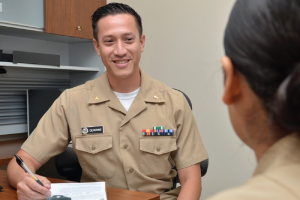By Jan E. Kennedy, Ph.D., Lisa H. Lu, Ph.D. and Matthew W. Reid, Ph.D.
March 27, 2020
 U.S. Navy photo by Jacob Sippel
U.S. Navy photo by Jacob Sippel
Untangling the relationship between traumatic brain injury (TBI and posttraumatic stress disorder (PTSD) is a complex challenge. Service members can experience both a mild TBI (also known as concussion) and psychological distress from combat situations, assaults and motor vehicle crashes. But research from the Defense and Veterans Brain Injury Center (DVBIC), a division of the Defense Health Agency Research and Development Directorate, has found that psychological experiences prior to TBI may play a role in recovery.
In a 2018 study from DVBIC's San Antonio site, we identified 165 service members with concussion, some of whom also had a diagnosis of PTSD. Drawing on data from our Prospective Traumatic Brain Injury Clinical Tracking Repository, we were able to collect information on life experiences and mental health prior to joining the military. We considered variables such as resilience and past trauma. The data showed that resilience, or "positive attitudes," were inversely associated with whether an individual reported symptoms from concussion and traumatic stress.
Interestingly, data from the same study revealed that how one copes with adversity, or the number of traumatic experiences, can impact symptoms reported from concussion. So that those who have experienced more adversity in life, such as really bad accidents, seeing someone hurt or die, or some other sudden event that was scary or horrific, reported greater concussion symptoms. This effect was independent from the effect of resilience.
Social support is also an important factor. In a survey of 326 service members with concussion, we found that the presence of regular social relationships – for example, consistent weekly interactions with friends and family – appeared to protect service members from concussion symptoms.
These findings contain important insights that may help military health care providers understand and treat service members with a history of concussion. Screening for prior trauma may help to identify those at greater risk of developing persistent post-concussion symptoms. Intervention that promotes resilience and social support may be an important part of a comprehensive intervention plan for those with a history of TBI.
Dr. Kennedy is the senior clinical research director, Dr. Lu is a research director and Dr. Reid is a research scientist for DVBIC. They work as contractors with General Dynamics Information Technology, for the DVBIC site at the San Antonio Military Medical Center, Ft. Sam Houston, Texas. Drs. Kennedy and Lu have doctorates in clinical psychology and conduct neuropsychological evaluations with service members at Brooke Army Medical Center, while Dr. Reid is a neuroscientist, heading research efforts focused on epigenetic and behavioral changes associated with TBI and PTSD.